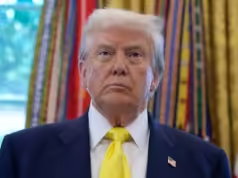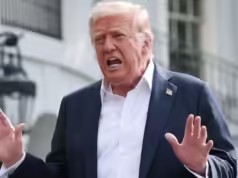An executive order announced by US President Donald Trump requires pharmaceutical corporations to lower their medicine prices to match those in other countries. Drug manufacturers are given a 30-day window to meet price objectives under the directive, and Trump has threatened to take additional steps to cut prices if they fail to make “significant progress” toward those benchmarks.
Trump stated that he wants to use the broad order to reduce prescription prices by at least 59%, and in some circumstances, by as much as 80% or 90%. “We should all equalize. The President stated that everyone ought to pay the same price.
Additionally, he accused the European Union of using “brutal” measures to force pharmaceutical corporations to sell their products at lower costs on their own soil, which would lead to the companies raising prices in the US to maintain their profits. “Whoever is paying the lowest price, that’s the price that we’re going to get,” Trump stated.
The US intends to implement a “Most Favoured Nation” policy as part of his plan, which would set the price of medications sold in the US at the lowest price paid by other nations for the identical medication. “Even though the United States is home to only 4 per cent of the world’s population, pharmaceutical companies make more than two-thirds of their profits in America,” Trump stated.
The European Union has acted in a very cruel manner. The Republican said, “The pharmaceutical companies actually told me stories about how they forced them, and it was just brutal.”
He went on to say that American consumers had been treated like “suckers” and specifically mentioned how much cheaper the obesity-fighting medication Ozempic was in Europe. He claimed to have learned that the weight-loss injection costs $88 in London and $1,300 in the US during a chat with an anonymous buddy.
Problem With US Drug Prices
Prescription medication costs in the United States are the highest among developed countries, frequently almost three times higher than in other nations. Trump attempted to align the US with other nations during her first term as well, but the courts thwarted her efforts.
Like his previous term, the proposal is subject to legal challenges and primarily depends on pharmaceutical firms’ goodwill to negotiate their pricing. The proposal is made as the president looks to fulfill a campaign pledge to combat inflation and cut costs for a variety of commonplace goods for Americans, such as eggs and auto fuel.
The Words of Trump’s Order
According to a copy of the order, the Trump administration will use rulemaking to bring drug prices down to international levels if manufacturers fail to meet government expectations. It will also look at a number of other options, such as imposing export restrictions and importing medications from other developed countries.
The government was also instructed by the ruling to think about enabling direct-to-consumer purchasing schemes that would allow the sale of medications at the same costs that other nations pay. Additionally, it instructed the US Federal Trade Commission to think about taking strong enforcement action against what the government claims are anti-competitive drugmaker activities.
Is It Going to Work?
Health policy lawyer Paul Kim told news agency Reuters that the executive order is likely to be challenged in court, especially for going beyond US legislative restrictions, such as those on importing medications from outside.
“The order’s suggestion of broader or direct-to-consumer importation stretches well beyond what the statute allows,” Kim stated.
But according to Georgetown Law health law expert Lawrence Gostin, such challenges are probably months away and will occur until the Trump administration takes more decisive steps to compel businesses to reduce their costs rather than using the “scattershot threats” contained in the executive order.
There will be a deluge of lawsuits when there are real repercussions, which we are aware of, and when pharmaceutical companies believe they must reduce the cost of their products, Gostin told Reuters.
Drug manufacturers and other healthcare organizations have long been the target of antitrust enforcement actions by the Federal Trade Commission. Last month, Trump gave the FTC instructions to work with other federal agencies to organize hearings on anticompetitive behavior in the pharmaceutical sector.
Today, President Donald Trump is implementing his campaign promise to reduce the cost of pharmaceuticals. Americans have had enough of being taken advantage of. In this new endeavor, the Federal Trade Commission will be a proud partner,” FTC spokesperson Joe Simonson stated.







